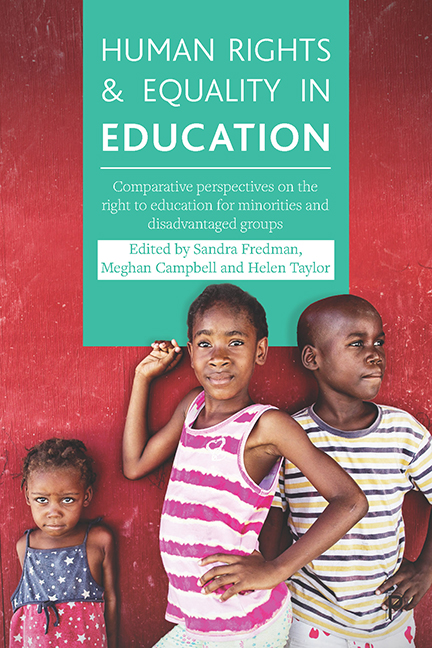 Human Rights and Equality in Education
Human Rights and Equality in Education Book contents
- Frontmatter
- Contents
- Notes on contributors
- Foreword
- Human rights and equality in education: Introduction
- Part I The role of public and private actors in education
- Part II Balancing the right to freedom of religion and culture and the right to education
- Part III Gender equality in education: moving beyond access to primary education
- Part IV Litigating for quality and equality in education
- Index
eight - Conceptualising and enforcing the right to quality education for minorities and disadvantaged groups: reflections of the Campaign for Fiscal Equity litigation
Published online by Cambridge University Press: 19 April 2022
- Frontmatter
- Contents
- Notes on contributors
- Foreword
- Human rights and equality in education: Introduction
- Part I The role of public and private actors in education
- Part II Balancing the right to freedom of religion and culture and the right to education
- Part III Gender equality in education: moving beyond access to primary education
- Part IV Litigating for quality and equality in education
- Index
Summary
Introduction: achieving access to quality education for all
Over the last fifteen years, there has been a gradual shift in focus from access to quality within the international drive for realising the human right to education. The dominant focus on access to education at the turn of the century was reflected in the target of universal primary education established by Millennium Development Goal 2 and initiatives like Education for All, the UNICEF-led movement that coordinates and supports international efforts to universalise primary education. Much progress has been made on this front, with enrolment in primary education in developing regions reaching 91% in 2015, a considerable improvement from 83% in 2000. However, although access is a necessary condition for realising the right to education, it is on its own not sufficient. Rather, access must be accompanied by the opportunity to obtain quality education, if education is to be a ‘multiplier’ or ‘enabling’ right that empowers people to live productive and fulfilling lives in society. This realisation has shaped the more nuanced target of Sustainable Development Goal 4 to ensure inclusive and quality education for all. This more refined aim of quality education for all is particularly important for ensuring equality in education, as an assessment of the discrepancies in the quality of education provided is often more telling of inequality in education, and in society more generally, than the all-or-nothing measure of access. The shift in focus towards quality of education is therefore highly relevant to the enforcement of the right to education for minorities and disadvantaged groups. Yet while this shift in emphasis presents a valuable opportunity for ensuring greater equality in education provision, it brings with it the challenge of how to conceptualise and enforce the right to quality education for minorities and disadvantaged groups.
This chapter will explore how this focus on ensuring quality education for all can strengthen both the conceptualisation and enforcement of the right to education for minorities and disadvantaged groups. In drawing this link between quality and equality in education, I will address two questions. First, I will consider what a human rights-based assessment of quality brings to our conception of the right to education, with a particular interest in the strategic value it may hold for minorities and disadvantaged groups in realising their right to education.
- Type
- Chapter
- Information
- Human Rights and Equality in EducationComparative Perspectives on the Right to Education for Minorities and Disadvantaged Groups, pp. 131 - 142Publisher: Bristol University PressPrint publication year: 2018


